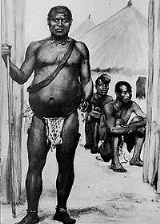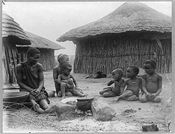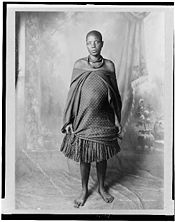
Lobengula
Encyclopedia
Lobengula Khumalo was the second and last king of the Ndebele
people, usually pronounced Matabele in English. Both names, in the Sindebele language, mean "The men of the long shields", a reference to the Matabele warriors' use of the Zulu shield and spear.
following the mfecane
("the crushing") or difaqane ("the scattering"). Shaka's general Mzilikazi led his followers away from Zulu territory after a falling-out. In the late 1830s they settled in what is now called Matabeleland in western Zimbabwe
, although claiming the sovereignty of a much wider area. The resulting kingdom was an Iron Age society in which the members of the tribe had a privileged position against outsiders whose lives were subject to the will of the king. In return for their privileges, however, the Matabele people both men and women had to submit to a strict discipline and status within the hierarchy and this set out their duties and responsibilities to the rest of society. Infringements of any social responsibilitie were punished with death subject to the king's seldom-awarded reprieve. This tight discipline and loyalty was the secret of the Matabele's success in dominating their neighbours.
the first king of the Matabele nation in 1868 the izinduna, or chiefs, offered the crown to Lobengula, one of Mzilikazi's sons from an inferior wife. Several impi
s (regiments) disputed Lobengula's assent and the question was ultimately decided by the arbitration of the assegai
, with Lobengula and his impis crushing the rebels. Lobengula's courage in this battle led to his unanimous selection as king.
About 10,000 Matabele warriors in full war costume attended the crowning of Lobengula. Their costumes consisted of a head-dress and short cape made of black ostrich feathers, a kilt made of leopard or other skins and ornamented with the tails of white cattle. Around their arms they wore similar tails and around their ankles they wore rings of brass and other metals. Their weapons consisted of one or more long spears for throwing and a short stabbing-spear or assegai (also the principal weapon of the Zulu). For defence, they carried large oval shields of ox-hide, either black, white, red, or speckled according to the impi (regiment) they belonged to.
The Matabele maintained their position due to the greater size and tight discipline in the army, to which every able-boydied man in the tribe owed service. "The Ndebele army, consisting of 15,000 men in 40 regiments [was] based around Lobengula's capital of Bulawayo."

By the time he was in his 40s, his diet of traditional millet beer and beef had caused him to be obese according to European visitors. Lobengula was aware of the greater firepower of European guns so he mistrusted visitors and discouraged them by maintaining border patrols to monitor all travellers' movements south of Matabeleland. Early in his reign he had few encounters with white men (although a Christian mission station had been set up at Inyati in 1859), but this changed when gold was discovered on the Rand within the boundaries of the South African Republic
in 1886. Lobengula had granted Sir John Swinburne the right to search for gold and other minerals on a tract of land in the extreme south-west of Matabeleland between the Shashi and Ramaquabane rivers in about 1870, in what became known as the Tati Concession
. However, it was not until about 1890 that any significant mining in the area commenced. Lobengula had been tolerant of the white hunters who came to Matabeleland
and he would even go so far as to punish those of his tribe who would threaten the whites. But he was wary about negotiation with outsiders and when a British team, F. R Thompson, Charles Rudd and Rochfort Maguire, came in 1888 to try to persuade him to grant them the right to dig for minerals in additional parts of his territory, the negotiations took many months. Lobengula only gave his agreement to Cecil Rhodes when his friend, Dr. Leander Starr Jameson
who had treated Lobengula for gout once before, secured money and weaponry for the Matabele in addition to a pledge that any people who came to dig would be considered as living in his Kingdom. As part of this agreement, and at the insistence of the British, neither the Boer
nor the Portuguese would be permitted to settle or gain concessions in Matabeleland. The 25-year Rudd Concession
was signed by Lobengula on 3 October 1888 and by Queen Victoria on 20 October 1889.

began in November 1893 and the British South Africa Company
's use of the Maxim gun
led to devastating losses for the Matabele warriors. As early as December 1893, it was reported that Lobengula had been very sick, but his death sometime in early 1894 was kept a secret for many months and the cause of his death remains inconclusive. The earliest accounts state it was smallpox
, later it was diagnosed as dysentery
, and some accounts mention poison
, although this seems unlikely. By October 1897, the white colonists had successfully settled in much of the territory known later as Rhodesia
and Matabeleland was no more.

Ndebele people (Zimbabwe)
The Ndebele are a branch of the Zulus who split from King Shaka in the early 1820s under the leadership of Mzilikazi, a former general in Shaka's army....
people, usually pronounced Matabele in English. Both names, in the Sindebele language, mean "The men of the long shields", a reference to the Matabele warriors' use of the Zulu shield and spear.
Background
The Matabele were related to the Zulu and fled north during the reign of ShakaShaka
Shaka kaSenzangakhona , also known as Shaka Zulu , was the most influential leader of the Zulu Kingdom....
following the mfecane
Mfecane
Mfecane , also known by the Sesotho name Difaqane or Lifaqane, was a period of widespread chaos and warfare among indigenous tribes in southern Africa during the period between 1815 to about 1840....
("the crushing") or difaqane ("the scattering"). Shaka's general Mzilikazi led his followers away from Zulu territory after a falling-out. In the late 1830s they settled in what is now called Matabeleland in western Zimbabwe
Zimbabwe
Zimbabwe is a landlocked country located in the southern part of the African continent, between the Zambezi and Limpopo rivers. It is bordered by South Africa to the south, Botswana to the southwest, Zambia and a tip of Namibia to the northwest and Mozambique to the east. Zimbabwe has three...
, although claiming the sovereignty of a much wider area. The resulting kingdom was an Iron Age society in which the members of the tribe had a privileged position against outsiders whose lives were subject to the will of the king. In return for their privileges, however, the Matabele people both men and women had to submit to a strict discipline and status within the hierarchy and this set out their duties and responsibilities to the rest of society. Infringements of any social responsibilitie were punished with death subject to the king's seldom-awarded reprieve. This tight discipline and loyalty was the secret of the Matabele's success in dominating their neighbours.
Birthright
After the death of MzilikaziMzilikazi
Mzilikazi , also sometimes called Mosilikatze, was a Southern African king who founded the Matabele kingdom , Matabeleland, in what became Rhodesia and is now Zimbabwe. He was born the son of Matshobana near Mkuze, Zululand and died at Ingama, Matabeleland...
the first king of the Matabele nation in 1868 the izinduna, or chiefs, offered the crown to Lobengula, one of Mzilikazi's sons from an inferior wife. Several impi
Impi
An Impi is an isiZulu word for any armed body of men. However, in English it is often used to refer to a Zulu regiment, which is called an ibutho in Zulu. Its beginnings lie far back in historic tribal warfare customs, where groups of armed men called impis battled...
s (regiments) disputed Lobengula's assent and the question was ultimately decided by the arbitration of the assegai
Assegai
An assegai or assagai is a pole weapon used for throwing or hurling, usually a light spear or javelin made of wood and pointed with iron.-Iklwa:...
, with Lobengula and his impis crushing the rebels. Lobengula's courage in this battle led to his unanimous selection as king.
Coronation
The coronation of Lobengula took place at uMhlanhlandlela, one of the principal military towns. The Matabele nation assembled in the form of a large semicircle, performed a war dance, and declared their willingness to fight and die for Lobengula. A great number of cattle were slaughtered and the choicest meats were offered to Mlimo, the Matabele spiritual leader, and to the dead Mzilikazi. Great quantities of millet beer were also consumed.About 10,000 Matabele warriors in full war costume attended the crowning of Lobengula. Their costumes consisted of a head-dress and short cape made of black ostrich feathers, a kilt made of leopard or other skins and ornamented with the tails of white cattle. Around their arms they wore similar tails and around their ankles they wore rings of brass and other metals. Their weapons consisted of one or more long spears for throwing and a short stabbing-spear or assegai (also the principal weapon of the Zulu). For defence, they carried large oval shields of ox-hide, either black, white, red, or speckled according to the impi (regiment) they belonged to.
The Matabele maintained their position due to the greater size and tight discipline in the army, to which every able-boydied man in the tribe owed service. "The Ndebele army, consisting of 15,000 men in 40 regiments [was] based around Lobengula's capital of Bulawayo."

Reign
Lobengula was a big, powerful, man with a soft voice who was well loved by his people but loathed by foreign tribes. He had well over 20 wives, possibly many more. His father, Mzilikazi, had around 200 wives. It is said he weighed about 19 stone (120 kg or 265 lb) and he was a fine warrior though not an equal of his father. Life under Lobengula was less strict than it had been under Mzilikazi, although the Ndebele retained their habit of raiding their neighbours.By the time he was in his 40s, his diet of traditional millet beer and beef had caused him to be obese according to European visitors. Lobengula was aware of the greater firepower of European guns so he mistrusted visitors and discouraged them by maintaining border patrols to monitor all travellers' movements south of Matabeleland. Early in his reign he had few encounters with white men (although a Christian mission station had been set up at Inyati in 1859), but this changed when gold was discovered on the Rand within the boundaries of the South African Republic
South African Republic
The South African Republic , often informally known as the Transvaal Republic, was an independent Boer-ruled country in Southern Africa during the second half of the 19th century. Not to be confused with the present-day Republic of South Africa, it occupied the area later known as the South African...
in 1886. Lobengula had granted Sir John Swinburne the right to search for gold and other minerals on a tract of land in the extreme south-west of Matabeleland between the Shashi and Ramaquabane rivers in about 1870, in what became known as the Tati Concession
Tati Concessions Land
The Tati Concessions Land was a concession created in the borderlands of the Matabele kingdom and the Bechuanaland Protectorate. The concession was originally made by the Matabele King to Sir John Swinburne...
. However, it was not until about 1890 that any significant mining in the area commenced. Lobengula had been tolerant of the white hunters who came to Matabeleland
Matabeleland
Modern day Matabeleland is a region in Zimbabwe divided into three provinces: Matabeleland North, Bulawayo and Matabeleland South. These provinces are in the west and south-west of Zimbabwe, between the Limpopo and Zambezi rivers. The region is named after its inhabitants, the Ndebele people...
and he would even go so far as to punish those of his tribe who would threaten the whites. But he was wary about negotiation with outsiders and when a British team, F. R Thompson, Charles Rudd and Rochfort Maguire, came in 1888 to try to persuade him to grant them the right to dig for minerals in additional parts of his territory, the negotiations took many months. Lobengula only gave his agreement to Cecil Rhodes when his friend, Dr. Leander Starr Jameson
Leander Starr Jameson
Sir Leander Starr Jameson, 1st Baronet, KCMG, CB, , also known as "Doctor Jim", "The Doctor" or "Lanner", was a British colonial statesman who was best known for his involvement in the Jameson Raid....
who had treated Lobengula for gout once before, secured money and weaponry for the Matabele in addition to a pledge that any people who came to dig would be considered as living in his Kingdom. As part of this agreement, and at the insistence of the British, neither the Boer
Boer
Boer is the Dutch and Afrikaans word for farmer, which came to denote the descendants of the Dutch-speaking settlers of the eastern Cape frontier in Southern Africa during the 18th century, as well as those who left the Cape Colony during the 19th century to settle in the Orange Free State,...
nor the Portuguese would be permitted to settle or gain concessions in Matabeleland. The 25-year Rudd Concession
Rudd Concession
The Rudd Concession was a written mining concession or agreement that Charles Rudd secured from Lobengula, King of Matabeleland on 13 October 1888. Rudd was a business associate of Cecil John Rhodes and he obtained the concession as his agent....
was signed by Lobengula on 3 October 1888 and by Queen Victoria on 20 October 1889.

Matabele war
It soon became obvious that Lobengula had been duped and that the British team really intended to colonise his territory. The First Matabele WarFirst Matabele War
The First Matabele War was fought in 1893-1894 between the British South Africa Company military forces and the Ndebele people. Lobengula, king of the Ndebele, avoided outright war with the British settlers because he and his advisors were mindful of the destructive power of the European weapons...
began in November 1893 and the British South Africa Company
British South Africa Company
The British South Africa Company was established by Cecil Rhodes through the amalgamation of the Central Search Association and the Exploring Company Ltd., receiving a royal charter in 1889...
's use of the Maxim gun
Maxim gun
The Maxim gun was the first self-powered machine gun, invented by the American-born British inventor Sir Hiram Maxim in 1884. It has been called "the weapon most associated with [British] imperial conquest".-Functionality:...
led to devastating losses for the Matabele warriors. As early as December 1893, it was reported that Lobengula had been very sick, but his death sometime in early 1894 was kept a secret for many months and the cause of his death remains inconclusive. The earliest accounts state it was smallpox
Smallpox
Smallpox was an infectious disease unique to humans, caused by either of two virus variants, Variola major and Variola minor. The disease is also known by the Latin names Variola or Variola vera, which is a derivative of the Latin varius, meaning "spotted", or varus, meaning "pimple"...
, later it was diagnosed as dysentery
Dysentery
Dysentery is an inflammatory disorder of the intestine, especially of the colon, that results in severe diarrhea containing mucus and/or blood in the faeces with fever and abdominal pain. If left untreated, dysentery can be fatal.There are differences between dysentery and normal bloody diarrhoea...
, and some accounts mention poison
Poison
In the context of biology, poisons are substances that can cause disturbances to organisms, usually by chemical reaction or other activity on the molecular scale, when a sufficient quantity is absorbed by an organism....
, although this seems unlikely. By October 1897, the white colonists had successfully settled in much of the territory known later as Rhodesia
Rhodesia
Rhodesia , officially the Republic of Rhodesia from 1970, was an unrecognised state located in southern Africa that existed between 1965 and 1979 following its Unilateral Declaration of Independence from the United Kingdom on 11 November 1965...
and Matabeleland was no more.

General references
- History of Rhodesia, by Howard Hensman (1900)
- Scouting on Two Continents, by Major Frederick Russell BurnhamFrederick Russell BurnhamFrederick Russell Burnham, DSO was an American scout and world traveling adventurer known for his service to the British Army in colonial Africa and for teaching woodcraft to Robert Baden-Powell, thus becoming one of the inspirations for the founding of the international Scouting Movement.Burnham...
, D.S.O. LC call number: DT775 .B8 1926. (1926) - The Downfall of Lobengula - The Cause, History & Effect of the Matabeli War by W A Wills and L T Collingridge, (1894)
External links
- Texts of the Moffat Treaty and Rudd Concession, signed by Lobengula, which gave Britain and the British South Africa Company rights over his land
- full-text of History of Rhodesia, by Howard Hensman (1900)
- History of Lobengula: Last King of the Matebele
- LOBENGULA IN A TRAP.; Not Believed that the Matabele King Can Escape. New York Times, 3 November 1893
- The Skull of Lobengula

